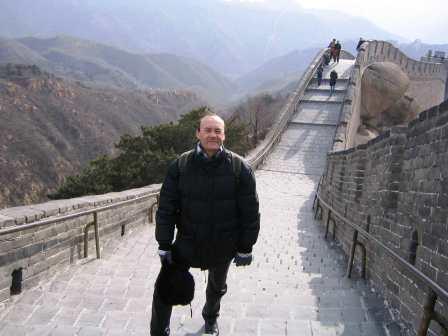
Last modified:
14/08/2006![]()
Human Relations (Updated on 02/06/06)
Here is an approach I would like to have done. I deliver it to you as it came to me.
"The meaning of a message is the change which it produces in the image." - Kenneth Boulding in The Image: Knowledge in Life and Society
-
The six most important words: "I admit I made a mistake."
-
The five most important words: "You did a good job."
-
The four most important words: "What is your opinion."
-
The three most important words: "If you please."
-
The two most important words: "Thank you,"
-
The one most important word: "We"
-
The least most important word: "I"
Environment change
.....

The acceleration of the changes of all natures, policies, economic, social, organisational, technological and human lead the company to adapt in a quasi permanent way. This implies that the old too rigid structures have evil to support the jolts of the change. The company must set up flexible and flexible structures, an evolutionary organization and the favorable framework in order to make it possible to the actors to exceed the resistances to change in a dynamics of transformation of mentalities.
The business world is
globalising but how fast?

The conventional view is that if the global office has not quite yet arrived, it is surely on its way. It is certainly the case that, in the future, small and large companies may find that they have financial consultants in London, IT specialists in California and computer programmers in Bangalore. Yet the experience of uniting businesses in different regions is sensitising top executives to the challenges and pitfalls of making international organisations work. But, if managers have been lured by the prospect of finding a global business culture, they were disappointed. And that is because the evidence is that, despite the fact that many of the world’s top managers study at the same business schools, read the same business journals, and communicate across time-zones using similar technological gizmos, cultural differences in management style and practice remain pervasive and widespread.

Social changes are characterized by consumers who are not satisfied any more standard products and services, they have requirements of quality, waitings and needs tending towards more freedom and of autonomy. About globalization, MNC can not anymore sell the same products everywhere in the world and have to adapt it to the needs, behavior and culture of the local market.

Economic changes are characterized by the globalisation of the market, competition within the EEC, the USA and Asia-Pacific countries with Japan and now China, activates economic turbulence. The strategic guideline for a successfull company used to be its competitiveness, then the quality of its management and its information system, now it is clearly its people.

Technology changes show us significant projections made in the field of New Communication and Information Technologies "NTIC". Strategic data processing gets significant competing advantages compared to the business data processing when it uses telecommunications. We will pass gradually from a synchronous mode of exchange of information between human beings to an asynchronous mode, thus defying time and space on a worldwide scale.

Organization changes, in a structure of "modular" firm, it induces the cooperation and the complementarity of internal and external entities (partners) making the borders of the organization fuzzy. The modular structure associated with the telecommunications networks creates interdependence and cooperative type with its environment reinforcing the bonds in spite of the nuclearisation. The costs of coordination become negligible if one considers the benefit generated by the co-operation of the actors of the internal organization with the environment; one speaks then about wide company.
Human change in front of technological changes poses a problem of conscience and ethics of which the resolution necessarily passes by a reorganization taking of account the human dimension of the change. This one is at the same time most delicate and at the same time richest of exploration so much it informs us about our own capacities of training. The actors of the company feel threatened by information technologies; the leaders and the intermediate framing are not excluded from it. The question is to know how to make disappear this threatening nature.
 but cultural difference still remains....
but cultural difference still remains....
Managers from different countries possess marked
dissimilarities in their attitudes to their company and their staff. In most
cases, these confirm what are, in fact, stereotypical images.
A worldwide survey by SHL found that American executives emerge as “go-getters”
whose attitudes translate into a passion for taking risks and living with the
consequences.
Swedish executives emerge as “people who care”, investing heavily in training
and aiding their staff. On average Swedish managers judged half of their
employees as “truly exceptional in the way they perform their jobs”.
In the UK, executives were found to have a “stalwart” character, operating in a
business environment that is risk-averse but, at the same time, favours “getting
the job done”. Perhaps the most distinctive culture, however, is found in Hong
Kong, where working patterns are strongly collectivist, managers spend large
amounts of time micro-managing employee output and work roles are distinctly
hierarchical. In this “worker bee” setting, a strong chief executive is highly
valued while, further down the hierarchy, staff are viewed as more dispensable.
 For example, the China-Britain Business Council
which organises business meetings between British small and medium enterprises
and their Chinese equivalents has produced a list of 10 tips to jetlagged
businessmen as they are transported to meet their Chinese counterparts. It
advises that business travellers should not be surprised by the willingness of
their interlocutors to feign agreement for the sake of saving face. They should
also be prepared for the interminable lunches and dinners over which much of the
wrangling will take place this last point is not so different with french
customs.
For example, the China-Britain Business Council
which organises business meetings between British small and medium enterprises
and their Chinese equivalents has produced a list of 10 tips to jetlagged
businessmen as they are transported to meet their Chinese counterparts. It
advises that business travellers should not be surprised by the willingness of
their interlocutors to feign agreement for the sake of saving face. They should
also be prepared for the interminable lunches and dinners over which much of the
wrangling will take place this last point is not so different with french
customs.
So if cultural differences are so pervasive, where do they stem from? Some observers cite factors based on the way countries work: in the free-for-all that is American capitalism or UK, employee turnover is high and so there is a strong ethos of entrepreneurial risk and individual performance. By contrast, in Sweden or France, the labour market is highly regulated and managers have to make the most of their existing staff.
Most cultural differences, however, go deeper than this. Business culture is not simply shaped by the economic system: more often, it is culture that forms the very foundation for economic life. There is general similarities within cultural groups, even where their social and economic histories are profoundly divergent: for all their differences, Hong Kong and mainland China have more in common with each other than they do with Sweden or the US. This suggests that cultural difference will persist for the foreseeable future. Yet, while this may make for a more interesting world in which to work, the lesson for business is somewhat ambivalent. Culture is more often a source of conflict than of synergy and cultural differences a nuisance at best and often a disaster.
But, if the experience of many companies
undergoing cross-border mergers has often proved him right, there are notable
exceptions. Take Renault’s decision to form an alliance with Nissan, buying a 37
per cent controlling stake five years ago. At the time, the decision was
received with widespread scepticism not least concerning fears of potential
conflict between French and Japanese management cultures. Yet it has proved to
be a surprising success story. Back in 1999, Nissan was $22bn in debt. This year
it has posted a $7.29bn profit.
Restructuring any business is a sensitive task, and 10 times so when that
business is Japanese a once-proud domestic champion that comes with a
jobs-for-life tradition. So it is probably no coincidence that the man who made
it work Carlos Ghosn, a Franco-Lebanese-Brazilian is a self-styled “citizen of
the world” whose eclectic background is widely considered to have given him the
cultural knowhow needed to succeed in a task where so many others would fail.
The Renault-Nissan story shows that cross-border mergers can work and that
managers with more “cultural intelligence” the ability to handle the different
values and expectations of different parts of the world are the best equipped in
this era of globalisation.
The new concept of people economy
A new generation of TCM 'Trans-Cultural Managers’ are beginning to make their appearance, recognizing the needs and requirements of their employees worldwide, decentralizing tasks and investing responsibilities, tailoring jobs to the people on board, and making sure they hire the right talent. These are the managers of the future. To illustrate what is going on in some companies, let' speak about the new concept of people economy, listen what some academic or visionary Managers said about it.
- In the past, organisations have been able to move ahead of their competitors with better equipment, better technology, or a better geographical location. Today, there is a pretty level playing field for most industries in all these respects. So, what is left? People.
(Vance Kearney,
Vice President of Human Resources, Oracle.)
- Innovation does not necessarily have to be a technological innovation. It could be an organisational innovation: a leadership innovation. (Kjell Nordström, leading Swedish management guru and professor at the Stockholm School of Economics.)
- Over the past decade, talent has become more important than capital, strategy,
or R&D. Think about the sources of competitive advantage that companies have.
Capital is accessible today for good ideas and good projects. Strategies are
transparent: even if you've got a smart strategy, others can simply copy it. And
the half-life of technology is growing shorter all the time. For many companies,
that means that people are the prime source of competitive advantage. (Ed
Michaels, Director with McKinsey & Co.)

The work undertaken on the field of the Consciousness remains the largest to be done on this new century. The path is may be in the area of research on the development of original methods to keep people awarness and high level of individual and collective consciousness.
Jean Michel de JAEGER
Management Consultant, Paris
Mobile : +33 (0) 615 028 515
email: jmdejaeger@yahoo.fr